Guide to Gaming on Board Game Arena

By MARK WILSON
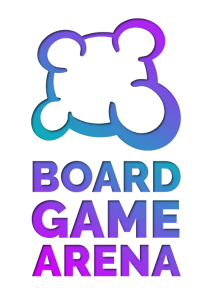
Rewind several years to 2020 when the COVID crisis hit. Like many, my social life was upended. And a big part of that social life involved board games and RPGs.
Nevermind that our social lives weren’t necessarily the most important aspect of the pandemic (or far from it). This is a gaming blog, so we won’t be going deeper there.
I shifted to playing a lot of online games around that time. The number of online options is truly impressive these days. Off the top of my head, I can list the following platforms that I’ve played on in recent years:
- Yucata
- Playingcards.io
- Virtual Tabletop
- Rally the Troops
- Online Board Gamers
- Tabletop Simulator
- Tabletopia
- VASSAL
- Board Game Arena
The last of those is the subject of this guide. It’s become arguably the most popular platform for online board gaming on the internet!
As I write this, BGA boasts well over 300 games, and the way games are scripted makes them easy to find others to play with and quickly play.
I’ve tried to absorb a lot of BGA in order to do this writeup, which has doubled as an excuse to learn a bunch of games to be able to teach them to my friends. Below is some of what I’ve learned to help streamline your BGA experience.
Get Started Playing on Board Game Arena Today
If all you’re looking to do is set up an account and start playing, watch the quick video below, which walks you through the basics of setting up games:
WATCH: Guide to Gaming on Board Game Arena
Free vs. Paid on BGA
BGA has a free level and a paid, Premium level. The latter comes with access to extra games, and things like post-game statistics, along with a few other benefits. Premium is very cheap, at only $3/month, or $36/year.
Premium games tend to be those that are newer or more sought-after. However, the majority of BGA’s catalog is available for free. Later in this article I discuss about 45 specific games, and only about 25% of them require Premium membership.
So while I think Premium is a great deal, it’s also not necessary.
Board Game Learning Tools
Each game page on BGA tends to have links to both an instructional video and a PDF copy of the rules. This is great for learning games before you play them, especially if you’ll be playing with strangers.
Additionally, some games let you “watch” either a pregenerated tutorial that exists within Board Game Arena’s interface. Or you can watch a previous match of the game on BGA to get a sense of the commands available to you, and the flow of the online experience.
Rather than trying to actually click through each in-game decision, there’s a “Play” button at the top that allows you to go step-by-step through the game you’re watching. While I don’t always use this feature before jumping into a live game, I certainly use it for more complicated games.
Making use of these tools is a great way to learn games and become comfortable playing them.
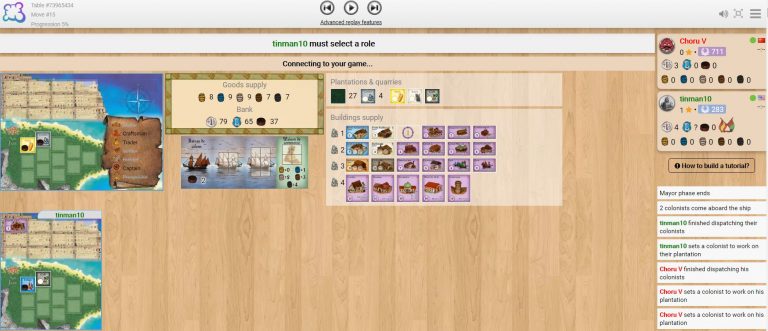
Curate Your BGA Experience
If you join a table, you’ll be at the mercy of whatever settings the host has set. While this is generally not a problem, a fair amount of customization is available to you if you host your own table.
For example, are you just learning a complex game and only want to play other beginners? Or a veteran who wants stiffer competition? Are you playing with friends and want a more generous time limit (or no time limit whatsoever on turns)? All of these and more are possible. Several games also include options to toggle expansion materials and game variants.
Using these settings by creating your own tables can help you curate your experience better.
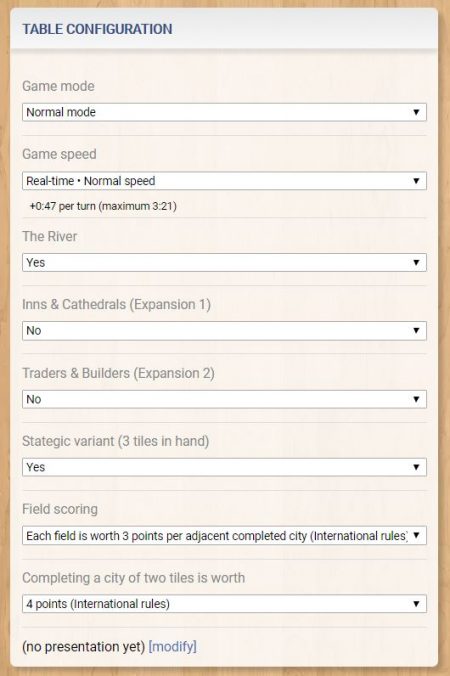
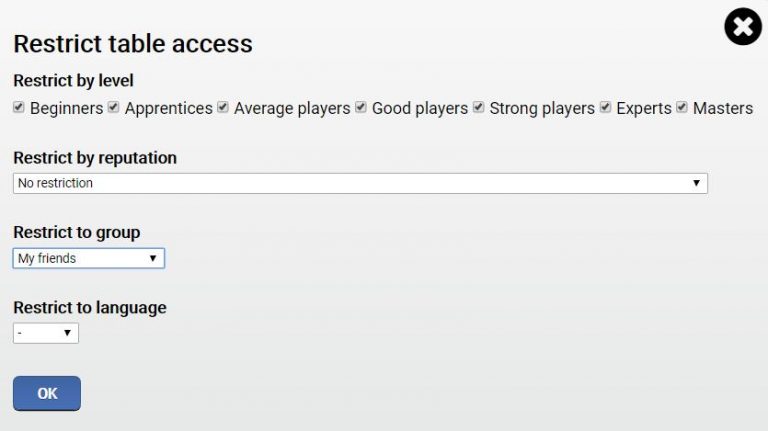
Asynchronous Play on Board Game Arena
My own preference is for live play, even if I’m playing with strangers (though ideally, it’s with friends as we voice chat). However, maybe your situation makes it hard to sit down for 10-75 minutes to play a full game. Or maybe you’d like to try out multiple games at once.
Board Game Arena allows you to play in real-time or asynchronously. Often there’s a turn timer on these games of an entire day, or perhaps 5x per day. Regardless, it allows for a slower pace that may better fit your schedule.
Asynchronous vs. Real-Time Board Gaming Online
While for me asynchronous gaming struggles to recreate the full excitement of live gaming, it can also be a lot of fun.
Importantly, some games are better asynchronously than others.
Which games are these? Making a list would be too difficult. Instead, I look for certain qualities in games I like to play asynchronously:
- Does the game feature large, complicated turns with multiple decisions? Or are there several micro-decisions you’ll have to make before sending it back to another player. These micro-turns tend to make asynchronous games drag.
- How present are social elements in the game? If I’m bluffing, lying to, or trading with another person, more of the interactive qualities will be lost in asynchronous play.
- Is there protracted downtime from, say, passing in a round? I prefer to play games asynchronously where I can fall into a rhythm. If I go several days without a turn, I often lose interest and struggle to remember what my strategy was.
Despite these considerations, a lot of games work wonderfully asynchronously. Sometimes they simply take time to discover.
Board Game Arena – The Games
If you just want to get started and begin exploring BGA, now is the time you can stop reading. Below I’ve listed many of the games I’ve played on BGA, as well as how closely I think they recreate their in-person counterparts.
In assessing them, I’m not reviewing them as games, per se. Rather, the brief writeups beneath each game focus more on the online implementation of the game on BGA, and what the differences are between online and live play.
Some do a great job of recreating the physical board game’s experience, and a few actually enhance the experience in some ways. Again, though, it’s not an assessment of the game itself, and I’m not aiming at anything more than anecdotal overview.
It’s also not an exhaustive list, but it’s a pretty good representative sample of a lot of popular hobby games available through the platform, and may give you ideas on what games to try out.
Reviewer’s Caveat
Even though I’m assessing implementations, not games themselves, below, there’s a fair amount of subjectivity, and each of the games below (and others not listed) can be lots of fun.
In general, games with high levels of interpersonal interactivity are harder to fully recreate in a digital environment, whereas those with more cerebral elements tend to fare better. Additionally, the more tactile elements a game includes, the further removed from it the digital experience will seem. There are exceptions to each of those, of course, and things like video chatting with friends while playing can further bridge this gap. However, the assessments below consider only BGA.
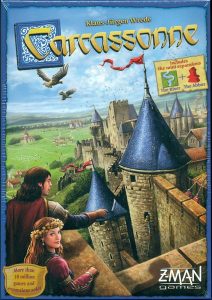
6 Nimmt!
One of the site’s most popular games owing to how quick it is, 6 nimmt is nevertheless a game that benefits most from the ribbing that occurs around a table as someone is inevitably stuck with the worst beats. Something is lost in translation when it’s automated and remote.
7 Wonders
Skips the setup and teardown, which are among the more onerous parts of the physical game, and gets you right to the drafting. Further, helpful little checkmarks and X’s cue you in to which options you can and can’t afford. Remarkably smooth play.
Buttons
Probably the only place many will see this game. The site is rife with options for “press your luck” games, this one among them. There’s nothing terrible in the implementation, but it’s missing the dice rolling.
Can’t Stop
Another press your luck. As a “hey, remember me?!” entry into BGA’s offerings, I enjoy its presence. It’s also very quick and well-known enough that it’s very easy to find a game.
Carcassonne
The biggest streamlined element here is that it automates field scoring, which can be a chore in some games. Options to toggle various expansions and variants exist as well, making this among the more modular games on the site.
Celestia
Among my favorite press your luck games, the digital implementation nevertheless loses something of the aesthetic charm of the airship in the physical version. Pushing your opponents off the ship against their will is among the funnier moments of the game, and here you’re deprived of that chance.
Even worse, the implementation rushes you through certain decisions, putting a very short timer on decisions like whether or not to use special ability cards. Frustrating.
Checkers
Unassuming in any format, neither better nor worse imo.
Chess
The option to filter opponents by skill level on BGA is a boon here. You can cater the competition to your skill level, particularly if you’re a beginner or remembering the strategy after years away from the game. Otherwise, my favorite Chess moments are across from a friend, thinking in meditative, comfortable, communal silence. An online game with a timer is devoid of this feeling.
Coloretto
Doesn’t suffer much, but it’s also not a game known for its table presence.
Colt Express
Like Celestia, something’s missing in the absence of a real, three-dimensional train to maneuver around. Otherwise fine.
Coup
Anything resembling social deduction is going to be worse online without a lot of effort, simply because the games were created for the exact opposite scenario. While Coup doesn’t quite fall into this genre, the table talk and interpersonal scheming that occur in a live session are the highlights, which digital will struggle to facilitate as smoothly.
Dice Forge
I dare say that engine builder Eurogames are going to suffer the least on BGA of any broad genre of game. That said, this one has you building and modifying dice, and that tactile thrill is part of the core experience, which an automatic dice roller can’t quite recreate.
Dragon Castle
While the physical version is lovely and impressive, the online implementation here is commendable, and the highlighted tiles to assist in drafting are a godsend. It’s not quite as cool as building, then picking apart, a real tile-castle, but it’s surprisingly close.
Elfenland
One of the more obscure Spiel des Jahres winners, you may struggle to find Elfenland elsewhere. That alone makes this worthwhile. The map is lovingly displayed, so there’s not too much missing between this and a real copy.
For Sale
Falls into the Coloretto category of being light, short and small enough that no version will be markedly better or worse.
Hanabi
With my chief difficulty in Hanabi being that I almost look at my cards accidentally, I might actually prefer the online version. Beware, though, regular BGA players of Hanabi have advanced cues that are not easy to pick up on, and I’ve seen them get frustrated with me and others for not understanding them, which saps the fun somewhat.
Hive
Not many casual players that I’ve found, so learning is going to be a lesson in losing for a while, until you absorb enough intermediate strategy to compete.
In the Year of the Dragon
A Stefan Feld engine-builder (sort of), and not particularly in need of face-to-face to enjoy. However, the shared suffering at the hands of the game can create a camaraderie that is more difficult to emulate online.
Incan Gold
A game chiefly interesting because of the hilarious moments of triumph or failure, which is best experienced in-person.
Jaipur
As a thoughtful, quick 2P experience, this feels very similar to the real thing to me, and is one of my favorites on BGA.
Kalah (Mancala)
The click-clack of the stones is sorely missing, particularly when you emphatically take a massive haul.
Keyflower
Among my personal favorites irl, this actually doesn’t seem to speed up a ton online, owing to the bidding and placement phases taking about the same amount of time. It’s also far worse asynchronously for this reason.
Kingdomino
See Coloretto/For Sale
Libertalia
Another I really enjoy irl, I miss laughing as someone ends up with a bad beat. Essentially, anything with even light “take that” mechanics is going to seem robbed of some of its joy. However, those elements are light enough in Libertalia that it’s still fine online, just not ideal.
Lost Cities
Like Jaipur, it benefits from the streamlined setup, without sacrificing much in terms of experience. One of my favorites to play on BGA.
Love Letter
Fine overall, and a bit better with the new cards that are available (which I believe only unlock at 5-8P on BGA), but then the downtime bloats at 7-8P. Play at 5P with all cards for an experience that differs significantly from the base game, but otherwise I avoid.
Puerto Rico
Per my earlier comments about engine builders, Puerto Rico is one that fares as well as any in this regard.
Quarto/Quoridor
Nice, quick way to match wits with a stranger, and no better or worse than a physical copy imo.
Race For the Galaxy
Those who play this online tend to play it a ton, so you may be in over your head if you’re new to the game. That said, this mostly insular card game is a breeze in its online implementation, so it makes it easy to learn and improve.
Red7
See Coloretto et al. These sort of filler-style card games fare well in nearly any setting.
Roll For the Galaxy
A bit more fiddly than its older sibling “Race,” and missing the chance to roll all those dice. If I’m going to play this, I want the real thing.
Russian Railroads
Crunchy, thinky engine-builder, literally and figuratively, so there’s very little lost in digital translation.
Saboteur
Fun in any format, but this really needs people crowded around a table to get the most from it.
Seasons
Another like 7 Wonders that benefits greatly from the automated setup, teardown, and automatic bean-counting of points and card abilities. I’ve actually not played Seasons outside BGA, but I suspect it could easily drag with all the different card abilities and different points at which they trigger. As such, it may be among the few that I prefer to play on Board Game Arena as opposed to in-person.
Stone Age
Maybe we’ve found another theme adjacent to engine-building, with worker placement games faring better than some genres into digital format.
Sushi Go
Quick and fun, but it’s not Sushi Go Party! (its superior sequel) so it’s very limited by comparison. As an implementation, it’s fine, but is so quick regardless that it’s no better or worse here.
Takenoko
A game that screams to be played with an opulent, physical copy, this will be pleasant online but not quite as magical.
Targi
Worker placement, and feels quite abstract, the digital version of this feels identical to playing irl for me.
The Werewolves of Miller’s Hollow
I know multi-night social deduction can work fine online, but boy does it require a lot of effort to even approach the same level of interaction.
Tokaido
I’m tempted to say this suffers like Takenoko since the art and components are lovely. But Tokaido is more about the art style, which translates better than elaborate components, which is more Takenoko’s forte. It’s also among the most modular games on the site, with numerous options to experiment with expansions, optional rules and variants.
Tournay
The forgotten little brother of Troyes, and it’s a good one, but is mired behind obtuse iconography. For me this is only playable online, due to how horribly confusing the iconography is. The mouseover text for each card is crucial to me being able to play coherently and enjoy myself.
Troyes
Another dice roller, which I prefer to do live. Troyes is also an engine-builder worker placement game, both of which translate admirably here. This is the game I’m most torn about relative to its physical version, but quite enjoy both.
It’s also a useful case study in live vs. asynchronous play, because asynch games can be extremely long and aren’t as satisfying because many turns only feature single, small decisions.
Tzolk’in
Sort of like Troyes in terms of implementation, the game itself holds up fine, but the grandeur of the board itself seems important to experience in-person.
Yahtzee
If you’re not playing to juggle the dice around endlessly in your hands, why are you playing? Kidding, but only sorta.
Conclusion
Tons of other great games exist on Board Game Arena, including some hobby stalwarts that I haven’t gotten to on BGA like Clans of Caledonia, Ark Nova and Terra Mystica. However, I hope the guide to the service above is helpful in your journey in online board gaming.
For other general questions about the platform, you can check out the BGA FAQ Page on their website.
Cheers!
______
Want to find more great board games, but would rather read in-depth reviews instead of brief summaries? Check out all my board game reviews on the Bumbling Through Dungeons blog.
Share
Recent Posts
Categories
- All (354)
- Announcements (4)
- Board Games (206)
- DMing (28)
- Game Design (16)
- Playing TTRPGs (22)
- Reviews (192)
- RPGs (142)
- Session Reports (91)
- Why Games Matter (9)